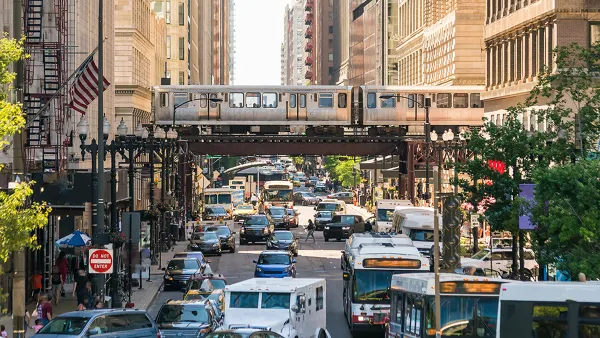The proposed expansion would affect smaller multi-family developments and include incentives for reducing travel during peak hours and encouraging transit, walking, and biking.

The Los Angeles Department of City Planning has proposed an ordinance that "would effectuate changes to the city's Transportation Demand Management (TDM) Program, which attempts to reduce the number of new car trips generated by large developments." As reported by Steven Sharp for Urbanize Los Angeles, the program would "would expand the TDM program's application to most multi-family residential developments with 16 or more residential units" and require developers to "choose from a menu of pre-approved TDM strategies which include including incentives for transit use, cycling, carpooling, and car sharing." The plan promotes "alternate modes of transportation, including cycling and transit, as well as steps to redistribute trips outside of peak hours."
According to Los Angeles Planning Director Vince Bertoni, "This program puts people first. It recognizes Angelenos' diverse transportation needs, invests in walkable, bike-friendly, transit-rich communities, and incentivizes the creation of walkable activity centers." Transportation Demand Management (TDM) defines a broad set of strategies and incentives designed to push developers to reduce or redistribute travel demand, reduce congestion, and promote walking, biking, and public transit as viable transportation options.
"[T]he Planning Department and LADOT are holding virtual workshops and public hearings prior to consideration by the City Planning Commission and City Council."
FULL STORY: City of L.A. to expand transportation demand management ordinance

Planetizen Federal Action Tracker
A weekly monitor of how Trump’s orders and actions are impacting planners and planning in America.

Chicago’s Ghost Rails
Just beneath the surface of the modern city lie the remnants of its expansive early 20th-century streetcar system.

Amtrak Cutting Jobs, Funding to High-Speed Rail
The agency plans to cut 10 percent of its workforce and has confirmed it will not fund new high-speed rail projects.

Ohio Forces Data Centers to Prepay for Power
Utilities are calling on states to hold data center operators responsible for new energy demands to prevent leaving consumers on the hook for their bills.

MARTA CEO Steps Down Amid Citizenship Concerns
MARTA’s board announced Thursday that its chief, who is from Canada, is resigning due to questions about his immigration status.

Silicon Valley ‘Bike Superhighway’ Awarded $14M State Grant
A Caltrans grant brings the 10-mile Central Bikeway project connecting Santa Clara and East San Jose closer to fruition.
Urban Design for Planners 1: Software Tools
This six-course series explores essential urban design concepts using open source software and equips planners with the tools they need to participate fully in the urban design process.
Planning for Universal Design
Learn the tools for implementing Universal Design in planning regulations.
Caltrans
City of Fort Worth
Mpact (founded as Rail~Volution)
City of Camden Redevelopment Agency
City of Astoria
City of Portland
City of Laramie





























